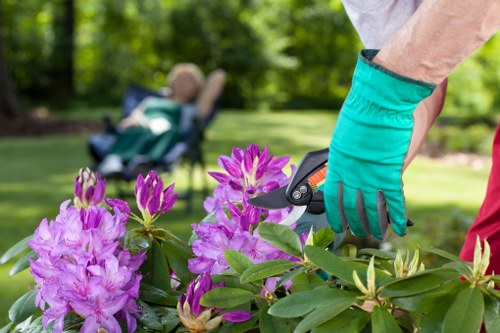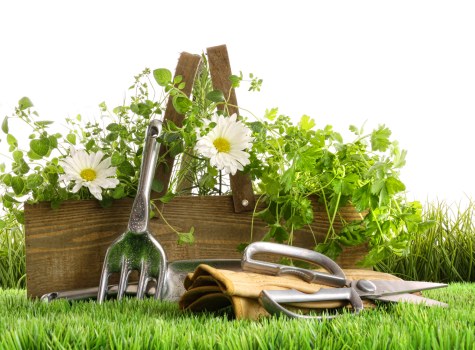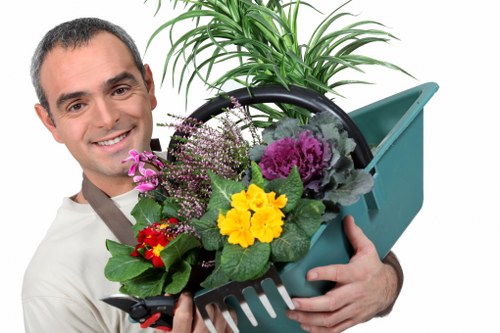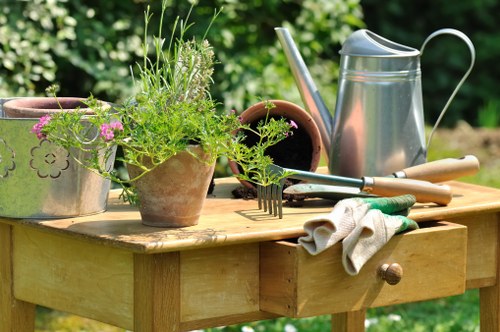Comprehensive Guide to Garden Maintenance in Barbican
Introduction to Garden Maintenance

Maintaining a beautiful garden in Barbican requires dedicated effort and knowledge of various horticultural practices. Whether you're a seasoned gardener or a beginner, understanding the essentials of garden maintenance can transform your outdoor space into a vibrant and thriving sanctuary.
In Barbican, where the climate and urban setting present unique challenges, tailored maintenance strategies are crucial. This guide will explore the key aspects of garden maintenance, offering practical tips and insights to help you achieve a lush and healthy garden.
From soil preparation to pest control, each element plays a vital role in the overall health of your garden. Let's delve into the comprehensive steps necessary to maintain your garden in Barbican effectively.
Soil Preparation and Health

Healthy soil is the foundation of any successful garden. In Barbican, the soil composition may vary, so it's essential to test and amend it to meet the needs of your plants.
Start by conducting a soil test to determine its pH level and nutrient content. Based on the results, you can adjust the soil using natural fertilizers, compost, or specific amendments to create an optimal growing environment.
Regularly aerating the soil helps improve drainage and root development. Incorporating organic matter not only enhances soil structure but also promotes beneficial microbial activity, essential for plant health.
Plant Selection and Placement

Choosing the right plants is critical for a thriving garden in Barbican. Consider the local climate, soil conditions, and the amount of sunlight your garden receives when selecting plant species.
Selecting native plants can be advantageous as they are well-adapted to the local environment, requiring less maintenance and being more resistant to pests and diseases.
Strategically placing plants based on their growth requirements and aesthetic appeal can enhance both the functionality and beauty of your garden. Grouping plants with similar needs together simplifies maintenance and ensures each plant thrives.
Watering Strategies

Proper watering is essential for garden maintenance. Overwatering or underwatering can lead to plant stress and increased susceptibility to diseases.
Implementing efficient irrigation systems, such as drip irrigation or soaker hoses, can provide consistent moisture directly to the plant roots, reducing water waste and minimizing evaporation.
Watering early in the morning or late in the evening helps prevent water loss and reduces the risk of fungal infections. Monitoring soil moisture levels regularly ensures that your plants receive the right amount of water.
Pruning and Trimming

Regular pruning and trimming are vital for maintaining the shape, health, and productivity of your plants.
Removing dead or diseased branches prevents the spread of infections and encourages new growth. Pruning also helps improve air circulation and light penetration within the plant canopy.
Use clean and sharp tools to make precise cuts, minimizing damage to the plants. Understanding the specific pruning needs of different plant species ensures optimal results and promotes vigorous growth.
Pest and Disease Management
Controlling pests and diseases is a critical aspect of garden maintenance in Barbican. Early detection and management can prevent minor issues from escalating into significant problems.
Implement integrated pest management (IPM) practices by combining biological, cultural, and chemical control methods. Encourage beneficial insects that prey on common garden pests and use organic pesticides as needed.
Maintaining plant health through proper watering, fertilization, and sanitation reduces susceptibility to pests and diseases. Regularly inspect your plants for signs of infestation or illness to address issues promptly.
Mulching Practices
Mulching is an effective technique for conserving soil moisture, suppressing weeds, and regulating soil temperature.
Apply a layer of organic mulch, such as bark, straw, or compost, around your plants. This not only enhances the aesthetic appeal of your garden but also improves soil fertility as the mulch decomposes.
Ensure that the mulch is applied evenly and kept a few inches away from plant stems to prevent moisture buildup and potential rot. Replenish mulch as needed to maintain its benefits throughout the growing season.
Fertilization Techniques
Providing adequate nutrients is essential for the growth and development of your garden plants. Fertilization should be tailored to the specific needs of your plants and the existing soil conditions.
Use a balanced fertilizer that supplies essential nutrients like nitrogen, phosphorus, and potassium. Organic fertilizers, such as compost or manure, offer a sustainable option that enriches the soil and supports microbial activity.
Apply fertilizers according to the recommended schedules and avoid over-fertilizing, which can lead to nutrient runoff and environmental harm. Regularly monitor plant growth to adjust fertilization practices as needed.
Lawn Care and Maintenance
A well-maintained lawn enhances the overall appearance of your garden in Barbican. Regular mowing, watering, and aeration are key components of effective lawn care.
Mow the lawn regularly, ensuring that blades are sharp and set to the appropriate height for your grass type. This promotes healthy growth and prevents weeds from establishing.
Aerate the lawn annually to relieve soil compaction and improve water and nutrient penetration. Overseeding can also help maintain a dense and lush lawn, filling in bare spots and enhancing resilience.
Seasonal Garden Maintenance
Adapting your garden maintenance practices to the changing seasons ensures year-round plant health and beauty.
In spring, focus on planting, pruning, and preparing the soil for the growing season. Summer maintenance includes regular watering, pest control, and mowing the lawn.
During autumn, clean up fallen leaves, mulch beds, and prepare plants for the winter months. In winter, protect sensitive plants from frost and plan for the next gardening season.
Sustainable Gardening Practices
Adopting sustainable gardening practices contributes to environmental conservation and long-term garden health in Barbican.
Utilize rainwater harvesting systems to reduce water consumption and minimize reliance on municipal water sources. Incorporate native and drought-resistant plants to decrease water and maintenance needs.
Composting organic waste not only reduces landfill contributions but also provides rich nutrients for your garden. Embrace eco-friendly pest control methods to protect beneficial insects and maintain biodiversity.
Professional Garden Maintenance Services
While DIY garden maintenance is rewarding, professional services can offer expertise and efficiency, especially for larger or more complex gardens in Barbican.
Professional gardeners provide comprehensive services, including design, planting, pruning, pest management, and seasonal maintenance. Their knowledge of local conditions ensures tailored solutions that enhance garden health and aesthetics.
Hiring a professional allows you to enjoy a beautiful garden without the time and effort required for maintenance. Consider consulting with local garden maintenance experts to discuss your specific needs and goals.
Tools and Equipment for Garden Maintenance
Having the right tools and equipment is essential for efficient garden maintenance in Barbican. Investing in quality tools not only makes tasks easier but also prolongs their lifespan.
Essential tools include hand pruners, garden shears, spades, rakes, and watering equipment. Electric or battery-powered tools can enhance productivity and reduce manual effort.
Regularly maintain your tools by cleaning, sharpening, and storing them properly. Well-maintained tools ensure safety and effectiveness in your gardening activities.
Creating a Maintenance Schedule
Organizing your garden maintenance tasks with a schedule ensures consistency and prevents tasks from being overlooked.
Create a seasonal calendar outlining tasks such as planting, pruning, fertilizing, and pest control. Allocate specific times for routine activities like watering and mowing to maintain a steady upkeep routine.
Using digital tools or garden planners can help track tasks and reminders, ensuring that all maintenance activities are performed timely and efficiently.
Benefits of Regular Garden Maintenance
Consistent garden maintenance offers numerous benefits, enhancing both the aesthetic and functional aspects of your outdoor space in Barbican.
Healthy gardens provide a peaceful retreat, improve property value, and contribute to environmental sustainability. Regular maintenance ensures vibrant plant growth, reduces the risk of pest infestations, and prevents plant diseases.
Moreover, a well-maintained garden promotes biodiversity, supports local wildlife, and fosters a connection with nature, enriching your overall quality of life.
Common Garden Maintenance Mistakes to Avoid
Avoiding common maintenance mistakes can save time, resources, and prevent damage to your garden in Barbican.
Overwatering is a frequent error that can lead to root rot and plant stress. Ensure that watering practices are tailored to the specific needs of each plant.
Neglecting regular pruning can result in overgrown and unhealthy plants. Additionally, improper fertilization may cause nutrient imbalances, affecting plant growth and health.
Enhancing Garden Aesthetics
Incorporating aesthetic elements into your garden maintenance routine enhances its visual appeal and creates a harmonious outdoor space.
Use decorative mulch, garden ornaments, and color-coordinated plants to add interest and character to your garden. Designing pathways and seating areas provides functional and attractive features.
Regularly updating plant arrangements and incorporating seasonal blooms keep your garden vibrant and inviting throughout the year.
Conclusion
Effective garden maintenance in Barbican requires a combination of knowledge, planning, and consistent effort. By following the guidelines outlined in this comprehensive guide, you can cultivate a thriving and beautiful garden that serves as a personal oasis and a source of pride.
Whether you choose to maintain your garden yourself or enlist the help of professional services, understanding the fundamental principles of garden care ensures lasting success and enjoyment.
Contact us today to learn more about our garden maintenance services and transform your Barbican garden into a stunning green haven.